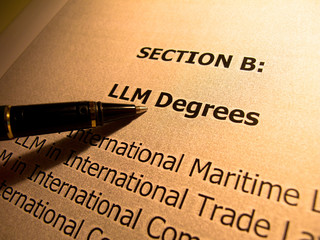About LLM

The Master of Laws (M.L. or LL.M.; Latin Magister Legum or Legum Magister) is a postgraduate academic degree, pursued by those either holding an undergraduate academic law degree, a professional law degree, or an undergraduate degree in a related subject. In some jurisdictions the "Master of Laws" is the basic professional degree for admission into legal practice. There are a wide range of LL.M. programs available worldwide, allowing students to focus on almost any area of the law.
Other LL.M. degree programs include bankruptcy law, banking law, commercial law, criminal law, dispute resolution, entertainment and media law, environmental law, estate planning (usually as a sub-specialty of tax law), financial services law, human rights law, information technology law, insurance law, intellectual property law, international law, law and economics, litigation, maritime law, military law, patent law, prosecutorial sciences, real estate law, social care law, telecommunications law, trade law, Trial Advocacy. Some law schools allow LL.M. students to freely design their own program of study from the school's many upper-level courses and seminars, including commercial and corporate, international, constitutional, and human rights law.
In Europe, LL.M. programs in European law are recently very popular, often referred to as LL.M. Eur (Master of European Law).
